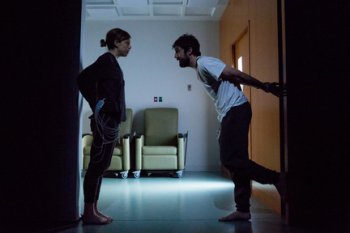The Effect
Provocative and powerful new play takes on the emotional, physical and ethical outcomes of drug testing.

Susannah Flood, George Demas, Kati Brazda and Carter Hudson in a scene from “The Effect” (Photo credit: Matthew Murphy)
[avatar user=”Victor Gluck” size=”96″ align=”left” ] Victor Gluck, Editor-in-Chief[/avatar]British playwright Lucy Prebble writes plays as up-to-date and current as tomorrow’s headlines. Her Enron produced on Broadway in 2010 investigated the financial crisis. Her first play, The Sugar Syndrome, seen at London’s Royal Court Theatre in 2003 exposed the dangers of Internet chat rooms, winning the George Devine Award for Most Promising Playwright in 2004. Originally produced at the National Theatre of Great Britain in 2012-13 and winning the Best New Play Award from the UK Critics Circle, The Effect, which takes on the emotional, physical and ethical outcome of drug testing, is having its American premiere at the Barrow Street Theater. Director David Cromer (Tribes, Really Really, A Raisin in the Sun, Our Town) continues to demonstrate that he can find and deliver exciting productions of plays both old and new.
In this provocative and powerful drama, Connie (Susannah Flood) and Tristan (Carter Hudson) have volunteered for a clinical drug trial at an upscale medical lab where they will be monitored 24 hours a day. He is an unattached drifter and she is in a relationship with an older divorced man while she finishes her doctoral dissertation in psychology and social science. While the trial pays a substantial fee, they will have to remain within the facility for four weeks and hand over all electronic devices during that time. All physical contact is forbidden. It is hinted to them that the experimental drug they will be taking is an anti-depressant which can change moods.
However, Connie and Tristan meet cute over submitting their urine samples and proceed to fall in love in a whirlwind romance. Dr. Lorna James (Kati Brazda), the psychiatrist officiating over the trial, is horrified: is it real love or is it a side effect of the drug? And if it is induced by the chemical, can it be trusted? Or is this exactly what the experimental drug is supposed to do, elevate their sense of euphoria? Having been burnt in love by Dr. Toby Sealey (Steve Key), the very doctor in charge of the facility, Dr. James eventually warns Connie. But on the other hand, are they on the medicine or is one of them on a placebo – in which case their love may be real – or not.

Susannah Flood and Carter Hudson in a scene from “The Effect” (Photo credit: Matthew Murphy)
Complicating the scenario is the fact that Dr. James is suffering from depression and has refused to take drugs. Her affair with Dr. Sealey some years earlier led to a nervous breakdown and this is the first time they have worked together. Things get heated: he entirely believes that depression is simply a chemical imbalance which can be corrected by drugs. She believes from her own personal experience that depression is a symptom, and not the disease. She also comes to suspect that she is also on trial after her nervous breakdown. When the trial goes horribly wrong and unforeseen side effects kick in, who is to blame? And who is the victim?
Directed in a cool, clinical style by Cromer and designed by Marsha Ginsberg in the antiseptic style of modern hospital facilities, the first act of The Effect is mainly expository, telling us the procedures, delineating the characters of Connie and Tristan, and following the progress of their illicit relationship. However, as the dosages are increased and time passes, the stakes are raised and tension rises. By the end of the first act we are sitting on the edge of our seats to discover where all of this is headed. And once Dr. James warns Connie that her feelings may not be real, the clock is ticking before the surprising denouement.
The Effect investigates the emotional, physical and ethical outcomes of drug testing, certainly a hot button issue in our time when we have come to expect a pill to solve all of our problems. The scientific portions are made human as we see them through the eyes of Connie and Tristan who must do everything at the same time as foils in the experiment. The parallel stories of test takers and warring doctors with a past history add to the visceral and intellectual pull of the play.
Cromer’s cast is as excellent as his productions have been in the past. Flood (who has previously appeared in Cromer’s production of Tribes) creates an uptight academic who always follows the rules, but when she falls, she falls hard. As her opposite (coincidence or chosen that way?), Hudson’s Tristan is a free-spirit, one who has no problem breaking the rules – he has brought extra cell phones which he keeps hidden- or going off backpacking and giving up his current life. Their chemistry is palpable, a necessary ingredient in our believing in their escalating relationship.

Kati Brazda and Steve Key in a scene from “The Effect” (Photo credit: Matthew Murphy)
Brazda’s Dr. James is introverted and professional, while eventually giving way to her emotions as she has come to believe that our reliance on anti-depressants does more harm than good. As Dr. Sealey, Key’s role is more tangential and we see him less. He is quickly made the villain as a bureaucrat who is most interested in the end result, that is, the successful marketing of the drug. His role is the most controversial: has he given up his ethics or does he really believe what he says? George Demas makes a silent appearance as a Research Lab Technician, one who is very adept at his work.
Although there are two permanent sets on stage, Ginsberg makes use of a wall which comes and goes, creating additional spaces at the facility. The slide projections of Maya Ciarrocchi keep us informed of each stage of the trials. The singular lighting by Tyler Micoleau is highly calibrated to suggest different times of the day as well as different rooms, lighted differently. Sarah Laux’s costumes are as antiseptic as the set, as the participants as well as the doctors wear their required uniforms.
Lucy Prebble’s The Effect is provocative and powerful and should stimulate much discussion. Ultimately, the play calls into question the efficacy of both drug trials and new psycho-pharmaceuticals. Do doctors understand the side effects well enough to proscribe mood changing drugs? The story told through the experience of two personable characters puts a human face on this scientific investigation. Director David Cromer and his excellent quartet of actors will have you hanging on every word even as you think you know where this is all going – and you would be wrong.
The Effect (extended through September 4, 2016)
Barrow Street Theatre and National Theatre of Great Britian
27 Barrow Street at 7th Avenue South, in Manhattan
For tickets, call 212-868-4444 or visit http://www.smarttix.com or http://www.BarrowStreetTheatre.com
Running time: one hour and 50 minutes including one intermission






Leave a comment